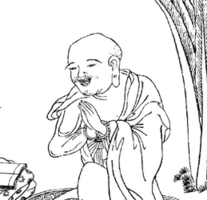Daosheng: Difference between revisions
No edit summary |
No edit summary |
||
| (One intermediate revision by the same user not shown) | |||
| Line 16: | Line 16: | ||
''Dates from The Princeton Dictionary of Buddhism (Princeton University Press, 2014)'' | ''Dates from The Princeton Dictionary of Buddhism (Princeton University Press, 2014)'' | ||
|images=File:Daosheng-Wikipedia.png | |||
|bornin=Pengcheng | |bornin=Pengcheng | ||
|DatesNotes=Dates and place of birth from ''The Princeton Dictionary of Buddhism'', Princeton University Press, 2014 | |DatesNotes=Dates and place of birth from ''The Princeton Dictionary of Buddhism'', Princeton University Press, 2014 | ||
| Line 21: | Line 22: | ||
|YearDeath=434 | |YearDeath=434 | ||
|BornIn=Julu in present-day Hebei province | |BornIn=Julu in present-day Hebei province | ||
|BuNayDefProvComplex=No | |||
|BuNayWheelTurnComplex=No | |||
|BuNayYogaMadhyaComplex=No | |||
|BuNayZhenRangComplex=No | |||
|BuNayVehiclesComplex=No | |||
|BuNayAnalyticMeditComplex=No | |||
|BuNayEmptyLuminComplex=No | |||
|HasDrlPage=Yes | |HasDrlPage=Yes | ||
|HasLibPage=Yes | |HasLibPage=Yes | ||
| Line 29: | Line 37: | ||
|MainNameKorTranslit=Tosaeng | |MainNameKorTranslit=Tosaeng | ||
|StudentOf=Huiyan; Kumārajīva | |StudentOf=Huiyan; Kumārajīva | ||
|IsInGyatsa=No | |IsInGyatsa=No | ||
}} | }} | ||
Latest revision as of 12:45, 3 August 2023
| PersonType | Category:Classical Chinese Authors Category:Ordained (Monks and Nuns) |
|---|---|
| MainNamePhon | Daosheng |
| MainNameChi | 道生 |
| SortName | Daosheng |
| bio | Daosheng (Chinese: 道生; pinyin: Dàoshēng; Wade–Giles: Tao Sheng), or Zhu Daosheng (Chinese: 竺道生; Wade–Giles: Chu Tao-sheng), was an eminent Six Dynasties era Chinese Buddhist scholar. He is known for advocating the concepts of sudden enlightenment and the universality of the Buddha nature.
Born in Pengcheng, Daosheng left home to become a monk at eleven. He studied in Jiankang under Zhu Fatai, and later at Lushan (Mount Lu) monastery with Huiyuan, and from 405 or 406 under Kumārajīva in Chang'an, where he stayed for some two years perfecting his education. He became one of the foremost scholars of his time, counted among the "fifteen great disciples" of Kumārajīva. Sengzhao reports that Daosheng assisted Kumārajīva in his translation of the Lotus Sutra, Daosheng wrote commentaries on the Lotus Sutra, the Vimalakīrti-nirdeśa Sūtra and the Aṣṭasāhasrikā Prajñāpāramitā Sūtra (the last of which has been lost). In 408, he returned to Lushan, and in 409 back to Jiankang, where he remained for some twenty years, staying at the Qingyuan Monastery (青园寺) from 419. Daosheng controversially ascribed Buddha-nature to the icchantikas, based on his reading on a short version of the Mahāparinirvāṇa Sūtra, which in that short form appears to deny the Buddha-nature to icchantikas; the long version of the Nirvāṇa Sūtra, however (not yet known to Daosheng), explicitly includes the icchantikas in the universality of the Buddha-nature. Daosheng's bold doctrine of including icchantikas within the purview of the Buddha-nature, even before that explicit teaching had actually been found in the long Nirvāṇa Sūtra, led to the expulsion of Daosheng from the Buddhist community in 428 or 429, and he retreated to Lushan in 430. With the availability of the long Nirvāṇa Sūtra after 430, through the translation of Dharmakshema, Daosheng was vindicated and praised for his insight. He remained in Lushan, composing his commentary on the Lotus Sūtra in 432, until his death in 434. Daosheng's exegesis of the Nirvāṇa Sūtra had an enormous influence on interpretations of the Buddha-nature in Chinese Buddhism that prepared the ground for the Chán school emerging in the 6th century. Dates from The Princeton Dictionary of Buddhism (Princeton University Press, 2014) |
| YearBirth | 355 |
| YearDeath | 434 |
| DatesNotes | Dates and place of birth from The Princeton Dictionary of Buddhism, Princeton University Press, 2014 |
| BornIn | Julu in present-day Hebei province |
| StudentOf | Huiyan · Kumārajīva |
| IsInGyatsa | No |
| Other wikis |
If the page does not yet exist on the remote wiki, you can paste the tag |

